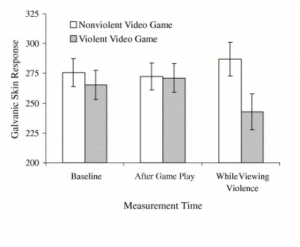There are many causes of crime and/or violence. Taking a criminology course here at Penn State made me realize that whether it be one’s social economic status or one’s environment, the things we do and the people around us influence us in ways we may not recognize. Growing up with a brother four years older than me led to me always be exposed to violent video games and eventually joining in on the “fun”. He was always playing versions of Grand Theft Auto and Call of Duty; both of which involve many forms of brutality and destructiveness. While these extremely popular video games are considered to be “fun” and nothing more, I started to consider that since we don’t recognize the things that influence us as easily as we may think, what if the violence we see in video games unknowingly leads us to exhibit such negative actions and attitudes in our everyday lives (crime and violence)?
Upon contemplating this question, I came across a scholarly article that discusses this issue through the use of observations on whether playing video games correlates with the use of violence away from the TV screen.
Through research done by Lieutenant Colonel David Grossman, who spent over 25 years trying to discover a way to teach soldiers how to kill, I discovered that he concluded that the techniques used to get soldiers to come to peace with killing, are similar to the techniques used in video games (see x). Hence, naturally, video games do cause violence. Yet, a game designer, Greg Costikyan, countered that video games aren’t real enough to have such a heavy impact on anyone that plays them. Essentially Costikyan is implying that there is not enough evidence to draw the conclusion that correlation equals causation in this case (see x). When observing younger children however, the author of the article concluded that they are more likely to be negatively affected by violent video games since their minds are just developing and are hence more vulnerable and likely to pick up the bad manners of video games and reciprocate them to their everyday lives. (x)
I also looked into an experiment done that observes whether those that play video games are less likely to be affected by real-life violence.
Experiment
In this experiment, 257 college student subjects were asked to give their input on their video game preferences and then their levels of aggression were measured. Then, they were given a video game to play; nonviolent or violent. From there, every subject was forced to watch a 10-minute video of real-life violence and their reactions were measured through heart rate and galvanic skin response (this is a change in resistance of the skin). Lastly, they had to rate the video game they played. (x)
Results
Researchers found that, as expected, those that played the violent video games were less triggered by the real-life violence. In respect to heart rate, the participants that played the violent game had a lower heart rate when watching the 10-minute video than immediately after they stopped playing the video game; hence, they were less reactive to the video than they were to the game. Those that played the nonviolent video game’s heart rate went up. The same response was true for galvanic skin response. (x)
The researchers concluded that this experiment demonstrates how playing a violent video game for just 20 minutes can lower one’s response to real-life violence. If a 20-minute video game had this outcome, what about those that play video games for many years of their lives? While this question can’t be answered, it is safe to conclude that video game violence can desensitize people from legitimate violence. The fact that it only can, although, means that correlation does not equal causation and that there is no actual mechanism behind this experiment. Also, since the study was done on college students they may suffer from things like anxiety that may have contributed to their reactions to the video, rather than whether they played a violent or nonviolent video game before. (x)





The Video games and violence debate has been going around for a while now, and it is becoming almost an issue. As we are seeing more acts of violence in this world, where to blame? do we blame the outside influences or do we just blame the person. I think it is all about the person in my opinion, of course outside influence is there, it is not effective. If a person can manage to play violent video games and mange not to hurt anyone or anything they should be fine, but that always is not the case. we can not just call kids who do acts of violence “crazy” because we have to step back and look at the situation at hand. The experiment was very informative too, it is always good to look at something from a different view.
I think that this is an interesting topic that has certainly been hotly debated. I personally am of the opinion that video games don’t drive people to violence specifically, since the evidence discussed here seems to point more to the games having the ability to desensitize people to violence. I also believe that there are lots of confounding variables that could have occurred in the second study, such as anxiety (like you said) and some people are simply more terrified and easily panicked by violence than others. There could also be desensitizing to violence occurring from others sources of media, such as TV shows and movies. Therefore, I think at this moment it seems pretty unlikely that video games drive people to commit violent acts. I think it’s more likely that people become desensitized to it instead.